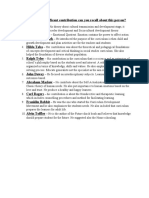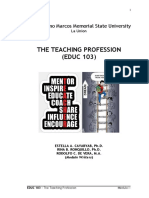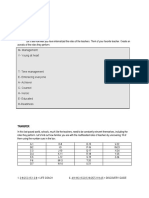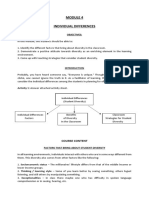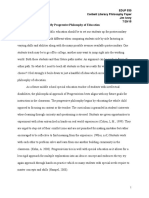Module 4 The Teaching Profession
Module 4 The Teaching Profession
Uploaded by
Shitama KyotoCopyright:
Available Formats
Module 4 The Teaching Profession
Module 4 The Teaching Profession
Uploaded by
Shitama KyotoOriginal Title
Copyright
Available Formats
Share this document
Did you find this document useful?
Is this content inappropriate?
Copyright:
Available Formats
Module 4 The Teaching Profession
Module 4 The Teaching Profession
Uploaded by
Shitama KyotoCopyright:
Available Formats
Study Guide in Prof.Ed.
103-The Teaching Profession Module 4: Unit 4 –Teacher as a Person I Society
Module No.4
Unit 4 – Teacher as a Person in Society
MODULE OVERVIEW
Society has high expectations of teachers. Teachers are expected to promote student's academic
progress as well as further students' social, emotional, and moral development and to safeguard
students' health and well-being. Teachers teach not to radically reshape society but rather to
transmit the traditional moral values and intellectual knowledge that students need to become
model citizens. The particular focus of this lesson is to explore significant literature and theories in
understanding the personal traits and values as well as important needs, rights, and roles of
teachers in the society. It will also include activities that will provide good insights and
perspectives about the human side of the teaching profession. It allows us to critically reflect on
relevant practices and issues of teachers. These will help us gain better understanding and embrace
our calling as teachers. Therefore, teachers play an important role in our life to become successful
in career and business. A good teacher helps us to become a good human being in society and a
good citizen of the country. Teachers know that students are the future of any nation. So the future
development of any nation is in the hands of teachers. They are also entitled to enjoy specific
rights.
LEARNING OBJECTIVES
1.Differentiate the meaning between teacher as a person in a society and teacher as a person of
good
moral character.
2. Explain teaching as vocation, mission and profession.
3.Discuss universal declaration of human rights of teachers.
4. Identify teachers’ values formation.
LEARNING CONTENTS
Unit 4 – Teacher as a Person in Society
A. Morality and the Foundational Moral Principle
- Morality can be a body of standards or principles derived from a code of conduct from a
particular philosophy, religion or culture, or it can derive from a standard that a person believes
PANGASINAN STATE UNIVERSITY 1
Study Guide in Prof.Ed.103-The Teaching Profession Module 4: Unit 4 –Teacher as a Person I Society
should be universal. Morality may also be specifically synonymous with "goodness" or "rightness".
-A foundational moral principle is, therefore, the universal norm upon which all
other principles on the rightness or wrongness of an action are based. It is the source of morality.
All men and women, regardless of race and belief, have a sense of this foundational moral
principle.
B. Teacher as Persons of Good Moral Character
It manifests the following:
strive to know the truth;
resolve to resist evil;
say nothing to hurt others;
respect life morality, and property;
engage in a job that does not injure others.
strive to free their mind of evil;
control their feelings and thoughts; and.
practice proper forms of concentration.
C. Value Formation
- Values can be described as spiritual skills. Values such as honesty, loyalty and patience are skills
of the higher or spiritual mind that is above the thinking mind. The formation of these values or
spiritual skills follows the same process as the formation of skills at lower levels. The core of
teaching consists of four basic values: dignity, truthfulness, fairness and responsibility &
freedom. All teaching is founded on ethics – whether it be the teacher-student relationship,
pluralism or a teacher's relationship with their work. Dignity means respect for humanity.
1. Cognitive, affective and psychomotor dimensions
values have a cognitive dimension: We must understand the value that we want to acquire.
We need to know why we have to value such. This is the heart of conversation and values
formation. We need to know how to live by that value. These are the concepts that ought to be
taught.
values are in the affective domain of objectives. In themselves they have an affective
dimension. For instance, “ it is not enough to know what honesty is or why one should be
honest. One has to feel something towards honesty, be moved towards honesty as preferable
to dishonesty” (Aquino,1990)
values are in the psychomotor skills which are important in implementation, and hence the
importance of “behavioral immersion” in increasing the impact of experiential learning in
PANGASINAN STATE UNIVERSITY 2
Study Guide in Prof.Ed.103-The Teaching Profession Module 4: Unit 4 –Teacher as a Person I Society
“wholeperson” learning in executive skill acquisition. This then lends to asking the question
of how to accomplish the learning person involvement, through the whole person, required to
complete the learning cycle from cognition awareness to successful skill demonstration
2. Training the Intellect and Will
Intellect -is a term used in studies of the human mind, and refers to the ability of the mind to come
to correct conclusions about what is true or false, and about how to solve problems.
Will -if one really wants to do something, he/she one can do it. Your will wills to act on the right
value and wills to avoid the wrong value presented by your intellect.
Value formation is a training of the Intellect and will Your intellect discerns a value and presents
it to the will as a right or wrong value. Your will wills to act on the right value and wills to avoid
the wrong value presented by your intellect.
It means value formation is the training of one's mind by growing in knowledge and
wisdom. This is taught first when a person is a child by parents and other influences. Value
formation then becomes personal training through choice of values desired to be achieved.
The intellect is the wisdom to know the difference between positive and negative values.
Will is personal encouragement to act on positive values instead of negative values guided
by intellect.
3. Max Scheler’s Hierarchy of Values
PLEASURE VALUES
- Pleasant against the unpleasant
- the agreeable against the disagreeable
* sensual feelings
* experiences of pleasure and pain
VITAL VALUES
- values pertaining to the well-being either individual or the community.
* health, vitality
- values of vital feeling
* capability, excellence
SPIRITUAL VALUES
- values independent of the whole sphere of the body and environment.
- grasped in spiritual acts of preferring loving and hating.
* aesthetic values: beauty against ugliness
* values of right and wrong
* values of pure knowledge
VALUES OF THE HOLY
PANGASINAN STATE UNIVERSITY 3
Study Guide in Prof.Ed.103-The Teaching Profession Module 4: Unit 4 –Teacher as a Person I Society
- appear only in regard to objects intentionally given as " absolute objects "
* belief
* adoration
* bliss
It was arranged in lowest to highest form of values.
4. Values Hierarchy
- Based on Scheler’s hierarchy of values, the highest values are those that directly pertain to the
Supreme being while the lowest values are those that pertain to the sensual pleasures.
D. Teaching as Vocation, Mission and Profession
Teaching as a profession “Teaching is a noble profession” The word “profession” is
synonymous to: Occupation, job, career, work, line of work. The word “professional”
means long & arduous years of preparation, a striving for excellence, a dedication to
public interest and commitment to moral & ethical values. If you consider teaching as a
profession, then: You must be willing to go through a long period of preparation. You
must be willing to go through continuing education (continuous development of
potentials) You must strive for excellence ( not “pwede na” mentality ) You commit
yourself to moral, ethical and religious values & dedicate yourself to service.
Teaching as a mission. The word mission is derived from the Latin word “misio” which
means “to send”. The Webster’s Dictionary defines “mission” as “task assigned”.
If teaching is your mission, then it means: a. It is the “task” entrusted to
you in this world. b. It is your assigned task thus you’ve got to prepare for
it! c. It calls for a continuing professional education. “Once a teacher,
forever a student”.
Teaching as a vocation. The word “vocation” comes from the Latin word “vocare” which
means “to call” thus vocation is a “call”. For Catholics, the CALLER is GOD Himself.
“Many are called but few are chosen” For Non-believers, the CALLER might be a man
calling another man. If teaching is your vocation, then it means: You said YES to your call
to teach! You commit yourself in the total transformation of the learner. You consider
teaching as a lifetime commitment thus aim through the years towards quality teaching.
“Teaching may not guarantee financial security but love of teaching has served as a
motivating factor to many teachers through the years”. Teaching has remained inspiring &
fulfilling.
PANGASINAN STATE UNIVERSITY 4
Study Guide in Prof.Ed.103-The Teaching Profession Module 4: Unit 4 –Teacher as a Person I Society
E. Universal Declaration of Human Rights
On December 10, 1948 the General Assembly of the United Nations adopted and proclaimed
the Universal Declaration of Human Rights. It has been translated into more than 350 languages
worldwide, and more than 100 African languages.
1. Everyone has the right to education. Education shall be free, at least in the elementary and
fundamental stages. Elementary education shall be compulsory. Technical and professional
education shall be made generally available and higher education shall be equally accessible to all
on the basis of merit.
2. Education shall be directed to the full development of the human personality and to the
strengthening of respect for human rights and fundamental freedoms. It shall promote
understanding, tolerance and friendship among all nations, racial or religious groups, and shall
further the activities of the United Nations for the maintenance of peace.
3. Parents have a prior right to choose the kind of education that shall be given to their children.
The charter addresses four key areas: personal rights, such as freedom and equality;
relationship rights, such as nationality and having a family; spiritual and political rights such as
the freedom of religion and voting; and economic, social and cultural rights, which cover work,
wages, education and social security.
LEARNING POINTS
We don’t live in a vacuum. We live in a society. Our society influences us to the extent that
we allow ourselves to be influenced by it. Our thoughts, values and actions somehow shaped by
events and by people with whom we come in contact. We, in turn, help shape society-its events, its
people, and in destiny.
John Donne said in his song, “No Man is an Island” …. “No Man Stands Alone… We need
one another…” In the context of your life as a teacher, we would say: “No teacher stands alone”.
Think of the many people who are helping you now become a teacher in the near future. In fact,
soon you will be called “teacher” in relation to a student, in the same manner that you will be
called “student” in relation to you as teacher.
The foundational moral principle is “Do good, Avoid Evil”. This is contained in natural law.
The natural law is engraved in the heart of every man and woman. We have in us the sense to do
the good that we ought to do and to avoid the evil that we ought to avoid. It is expressed actually in
PANGASINAN STATE UNIVERSITY 5
Study Guide in Prof.Ed.103-The Teaching Profession Module 4: Unit 4 –Teacher as a Person I Society
many other ways by different people. The famous Chinese Philosopher, Kung-Fu-Tzu taught the
same principle when he said “Do not do to others what you do not like others do to you”. Our act is
moral when it is accordance with our human nature. Our intellect and free-will will make us
different from and above the beast. As a teacher, you are expected to be a person of good moral
character when you are :human, loving, virtuous and mature.
Teacher as a Person in Society covers the: Morality and the Foundational Moral Principle,
Teacher as Persons of Good Moral Character, Value Formation, Teaching as Vocation, Mission
and Profession and Universal Declaration of Human Rights.
Review Exercises
Name: _________________________________ Date: _________
Year & Section__________________________ Score: __________
Activity 1.1 Read Article XI of the Code of Ethics then answer the following questions:
1. What is the big challenge for a teacher?
_________________________________________________________________________
_________________________________________________________________________
_________________________________________________________________________
_________________________________________________________________________
_________________________________________________________________________
_________________________________________________________________________
.
2. Are you ready to face challenge?
_________________________________________________________________________
_________________________________________________________________________
_________________________________________________________________________
_________________________________________________________________________
_________________________________________________________________________
_________________________________________________________________________
.
LEARNING ACTIVITIES
PANGASINAN STATE UNIVERSITY 6
Study Guide in Prof.Ed.103-The Teaching Profession Module 4: Unit 4 –Teacher as a Person I Society
Review Exercises
Name: _________________________________ Date: _________
Year & Section__________________________ Score: __________
Activity 1.2 Fill in the blank
Teaching: Mission or Job? From the given statements below you may choose between
the two. Write the answer from the space provided.
1. If you are doing it only because you are paid for it, it’s a___________?
2. If you are doing it not only for the pay but also for service, it’s a _____________?
3. If you quit because your boss or colleague criticized you, it’s a _____________?
4.If you keep on teaching out of love, it’s a ________________?
5.If you teach because it does not interfere with your activities, it’s a ______________?
6.If you are committed to teaching even if letting go of other activities, it’s ___________?
7. If you quit because no one praises or thanks you for what you do, it’s a ____________?
8. If you remain teaching even though nobody recognizes your efforts, it’s a_____________?
9.If our concern is success, it’s a _______________?
10.If our concern is success plus faithfulness, it’s a ________________?
PANGASINAN STATE UNIVERSITY 7
Study Guide in Prof.Ed.103-The Teaching Profession Module 4: Unit 4 –Teacher as a Person I Society
Review Exercises
Name: _________________________________ Date: _________
Year & Section__________________________ Score: __________
Activity 1.3 Test your understanding.
1. Do we have such a thing as unchanging values in theses changing times?
_____________________________________________________________________________
___________________________________________________________________.
2. Should values be taught? Why?
_____________________________________________________________________________
_____________________________________________________________________________
_____________________________________________________________________________
_____________________________________________________________________________.
3. What is the effect of good habit (virtue) and bad habit (vice) on the will?
_____________________________________________________________________________
_____________________________________________________________________________
_____________________________________________________________________________
_____________________________________________________________________________
_____________________________________________________________________________.
4. Which is the lowest value in Scheler’s value hierarchy? highest?
_____________________________________________________________________________
_____________________________________________________________________________
____________________________________________________________________________.
5. ” Do good, Avoid Evil” is the foundational moral principle. List at least 5 good things that
you have to do as a teacher and 5 evil things you have to avoid doing.
_____________________________________________________________________________
_____________________________________________________________________________
_____________________________________________________________________________
_____________________________________________________________________________
_____________________________________________________________________________
PANGASINAN STATE UNIVERSITY 8
Study Guide in Prof.Ed.103-The Teaching Profession Module 4: Unit 4 –Teacher as a Person I Society
6.By means of a poem or an Acrostic (on the word MORALITY), show the importance of
morality.
_____________________________________________________________________________
_____________________________________________________________________________
_____________________________________________________________________________
_____________________________________________________________________________
_____________________________________________________________________________
_____________________________________________________________________________
_____________________________________________________________________________
_____________________________________________________________________________
_____________________________________________________________________________
_____________________________________________________________________________
_____________________________________________________________________________
_____________________________________________________________________________
_____________________________________________________________________________
_____________________________________________________________________________.
PANGASINAN STATE UNIVERSITY 9
Study Guide in Prof.Ed.103-The Teaching Profession Module 4: Unit 4 –Teacher as a Person I Society
REFERENCES
Salandanan, Gloria G.Methods of Teaching . LORIMAR Publishing, INC.
Salandanan,Gloria G.Elements of Good Teaching LORIMAR Publishing, INC.
Salandanan, Gloria G.Teaching and the Teacher. LORIMAR Publishing, INC.
Pawilen ,Greg T..Copyright 2019.Teaching Profession Passion and Mission Second Edition.REX
Bookstore Publishing Co.
BilbaoPurita et.al.Copyright 2012.The Teaching Profession,Second Edition.LORIMAR Publishing,
Inc.
BilbaoPurita et.al.Copyright 2018.The Teaching Profession, Fourth Edition.LORIMAR Publishing,
Inc.
BilbaoPurita et.al.Copyright 2006.The Teaching Profession,LORIMAR Publishing, Inc.
Prepared by : DR .SHIRLEY L. MILANES
Faculty/Program Chair, Beed &
BTEd
PANGASINAN STATE UNIVERSITY 10
You might also like
- Levin Daniel Caltpa c1 s1 A GettingtoknowyourstudentsssDocument6 pagesLevin Daniel Caltpa c1 s1 A Gettingtoknowyourstudentsssapi-499003355100% (7)
- Units1 6 Workshop Handouts 1Document13 pagesUnits1 6 Workshop Handouts 1sweetkim05150% (2)
- Educ 100 Module 1Document60 pagesEduc 100 Module 1Jay Roy Dela CruzNo ratings yet
- The Teaching Profession Lesson 1 Teaching As A ProfessionDocument15 pagesThe Teaching Profession Lesson 1 Teaching As A ProfessionJim Boii91% (33)
- TP 5562 e Navigation Cadet Training ProgramDocument164 pagesTP 5562 e Navigation Cadet Training Programmrraj69100% (2)
- Module 1 REVIEWER W HighlightsDocument8 pagesModule 1 REVIEWER W HighlightsLeila Ricci LlanilloNo ratings yet
- Teacher in SocietyDocument7 pagesTeacher in SocietyRufina VerdeNo ratings yet
- Module 1 - Prof Ed 4Document5 pagesModule 1 - Prof Ed 4Angelo B. LabayoNo ratings yet
- Teaching Profession (Reflection Meeting 1)Document1 pageTeaching Profession (Reflection Meeting 1)Debby MulyaNo ratings yet
- Typology of Learners With Special NeedsDocument10 pagesTypology of Learners With Special NeedsKaiden GaizerNo ratings yet
- Lesson 2 TEACHING AS A VOCATION NewDocument30 pagesLesson 2 TEACHING AS A VOCATION Newlycan haluuNo ratings yet
- Information Processing Theory: Avorque, Razelle Angiela A. BSNED ES12Document1 pageInformation Processing Theory: Avorque, Razelle Angiela A. BSNED ES12Razelle Angiela AvorqueNo ratings yet
- Reviewer 2Document109 pagesReviewer 2Shiela P. ZumarragaNo ratings yet
- Edward Lee Thorndike: Connectionism TheoryDocument12 pagesEdward Lee Thorndike: Connectionism TheoryLEANA JAN CANDOLETANo ratings yet
- Pre Spanish EraDocument1 pagePre Spanish EranoralieNo ratings yet
- Activity 2.4Document1 pageActivity 2.4Erwin GambanNo ratings yet
- Eced 21 Module 1Document24 pagesEced 21 Module 1Joanna Mae MendozaNo ratings yet
- Ordoña, Caroline N. Beed 2B Profed 603Document3 pagesOrdoña, Caroline N. Beed 2B Profed 603carol navaretteNo ratings yet
- Lesson 1: Learner-Centered Psychological Principles (LCP)Document5 pagesLesson 1: Learner-Centered Psychological Principles (LCP)cee padillaNo ratings yet
- Week 4 - Principles of ExeciseDocument10 pagesWeek 4 - Principles of Execisedave lucasNo ratings yet
- Beed-Ii-B - Nobleza Module 1Document3 pagesBeed-Ii-B - Nobleza Module 1Kim NoblezaNo ratings yet
- Lesson 2-Teaching As A Vocation and MissionDocument3 pagesLesson 2-Teaching As A Vocation and MissionChristianne VenturaNo ratings yet
- Table of Content: Teacher's Rights, Duties and ResponsibilitiesDocument4 pagesTable of Content: Teacher's Rights, Duties and Responsibilitiesmelody paragas100% (1)
- Syllabus in Pathfit2Document17 pagesSyllabus in Pathfit2Saila mae SurioNo ratings yet
- School Rituals, Traditions and CeremoniesDocument30 pagesSchool Rituals, Traditions and CeremoniesSHIELANY MARIE BANDIALANo ratings yet
- Module 1 ProfDocument27 pagesModule 1 ProfNoelle LuadNo ratings yet
- Multicultural Diversity: A Challenge To Global Teachers"Document1 pageMulticultural Diversity: A Challenge To Global Teachers"jasminNo ratings yet
- Teaching Profession Activities On Modules 1 2Document9 pagesTeaching Profession Activities On Modules 1 2Ana Lea AlmazanNo ratings yet
- Module 3 - The Teaching Profession - Calimlim, Wrensly M.Document3 pagesModule 3 - The Teaching Profession - Calimlim, Wrensly M.Wrensly CalimlimNo ratings yet
- Educ 109 SIM 1-3Document39 pagesEduc 109 SIM 1-3Danin Jade Ignacio QuilosNo ratings yet
- The Historical Foundation of Education General ObjectivesDocument13 pagesThe Historical Foundation of Education General ObjectivesJuvy Mae Delos Santos - DinaluanNo ratings yet
- 214 - Module1Document34 pages214 - Module1JD VergaraNo ratings yet
- CONTENT - Module 2 Lesson 2Document2 pagesCONTENT - Module 2 Lesson 2Leara Jane MarananNo ratings yet
- MODULE 4-Prof Ed 9ADocument27 pagesMODULE 4-Prof Ed 9AAnnie Jane SamarNo ratings yet
- Updated Teaching Profession SyllabusDocument9 pagesUpdated Teaching Profession SyllabusAna Lea AlmazanNo ratings yet
- Prof Ed 101 The Teaching ProfessionDocument11 pagesProf Ed 101 The Teaching ProfessionRonald CataNo ratings yet
- What Difficulties Are They Experiencing in TeachingDocument2 pagesWhat Difficulties Are They Experiencing in TeachingJason CatalinoNo ratings yet
- EDUC 2 (Activity 5)Document4 pagesEDUC 2 (Activity 5)Omar Gragasin ArenasNo ratings yet
- Bases and Policies of Special and Inclusive Education: Module 7-8 (Finals)Document24 pagesBases and Policies of Special and Inclusive Education: Module 7-8 (Finals)ArvinB. NarcisoNo ratings yet
- Educ 9 (Final Exam)Document5 pagesEduc 9 (Final Exam)Judy DiotayNo ratings yet
- Historico LegalandphilosophicalDocument63 pagesHistorico Legalandphilosophicallitabolo19100% (1)
- M-Management Y - Young at HeartDocument8 pagesM-Management Y - Young at HeartKieth InlabNo ratings yet
- L7 - Graded ActivitiesDocument13 pagesL7 - Graded ActivitiesLoger Kent BernabeNo ratings yet
- Module 1 The Teaching Profession Bautista, AushwinDocument9 pagesModule 1 The Teaching Profession Bautista, AushwinOshuu desuNo ratings yet
- The Curriculum Should Be Designby Teachers BasedDocument4 pagesThe Curriculum Should Be Designby Teachers BasedRodel YapNo ratings yet
- Assessment Ed 8 Module 3 FinalDocument17 pagesAssessment Ed 8 Module 3 Finalmarvs100% (1)
- Lesson 1 Socially Responsible TeacherDocument80 pagesLesson 1 Socially Responsible TeacherJerica Palomaria50% (2)
- ModuleDocument8 pagesModuleMerry Joy Tauro Libo-onNo ratings yet
- Module BSED BTLED PROFED3-Module3-1-1Document12 pagesModule BSED BTLED PROFED3-Module3-1-1jasminebueno delfin100% (1)
- MODULE 4 and 5 FacilitatingDocument7 pagesMODULE 4 and 5 FacilitatingJUNALYN ALIGWAYNo ratings yet
- Philosophy of Education and Personal Philosophy of Teaching: in This ModuleDocument26 pagesPhilosophy of Education and Personal Philosophy of Teaching: in This ModuleJessa Mae Lopez DonayreNo ratings yet
- Quiz - Ed2 Giftedness and TalentDocument4 pagesQuiz - Ed2 Giftedness and TalentCrysvenne Perez BisligNo ratings yet
- Part 3-Module 9 Gestalt Psychology PDFDocument27 pagesPart 3-Module 9 Gestalt Psychology PDFSheena BarulanNo ratings yet
- Module 7 Social Ethical and Legal Responsibilities in The Use of Technology Tools and ResourcesDocument24 pagesModule 7 Social Ethical and Legal Responsibilities in The Use of Technology Tools and ResourcesQUEDOR CHRISTIAN ANGELONo ratings yet
- Philosophy of EducationDocument2 pagesPhilosophy of EducationRalph Rexor Macarayan BantuganNo ratings yet
- My Progressive Philosophy of EducationDocument6 pagesMy Progressive Philosophy of Educationapi-298763096100% (2)
- EDUC 109 (2649) - Teaching Profession: Submitted By: Kristine Nicolle E. DanaDocument3 pagesEDUC 109 (2649) - Teaching Profession: Submitted By: Kristine Nicolle E. DanaNikki DanaNo ratings yet
- Module 2 PhilosophicalDocument9 pagesModule 2 PhilosophicalNalon RitramNo ratings yet
- Social LiteracyDocument11 pagesSocial LiteracyBadens DgNo ratings yet
- Prof Ed 6 Facilitating Learner Centered TeachingDocument19 pagesProf Ed 6 Facilitating Learner Centered TeachingIvy Jean RaseNo ratings yet
- Quiz in Unit II. Instructional PlanningDocument1 pageQuiz in Unit II. Instructional PlanningBeth OdiamanNo ratings yet
- Psychological Foundation of CurriculumDocument15 pagesPsychological Foundation of CurriculumJhonalyn LubatonNo ratings yet
- Educ 3 Mode 4-7Document32 pagesEduc 3 Mode 4-7Jessa mae BorjaNo ratings yet
- A Brief History of Badminton from 1870 to 1949From EverandA Brief History of Badminton from 1870 to 1949Rating: 3.5 out of 5 stars3.5/5 (2)
- Critical AnalysisDocument2 pagesCritical AnalysisSyuhada NabilahNo ratings yet
- My Classroom Management Plan Villar PostradoDocument6 pagesMy Classroom Management Plan Villar PostradoNyca PacisNo ratings yet
- Jordan Korth ResumeDocument1 pageJordan Korth Resumeapi-192654920No ratings yet
- Call For An International Student ConferenceDocument4 pagesCall For An International Student ConferencePetrovici ConstantinNo ratings yet
- Foreign Teacher ContractDocument3 pagesForeign Teacher ContractMuntana Tewpaingam100% (1)
- Scratch To Encourage Cross-Curricular Coding Activities 1Document2 pagesScratch To Encourage Cross-Curricular Coding Activities 1api-659774512No ratings yet
- Kdeighton ResumeDocument4 pagesKdeighton Resumeapi-356398248No ratings yet
- Improving The Teaching of TLE-Garment Construction Through Recorded Video Lessons (RVL) As Supplementary Learning ToolDocument10 pagesImproving The Teaching of TLE-Garment Construction Through Recorded Video Lessons (RVL) As Supplementary Learning ToolPsychology and Education: A Multidisciplinary JournalNo ratings yet
- Which of The Following Must Be REMOVED From The Types of Learning OpportunitiesDocument6 pagesWhich of The Following Must Be REMOVED From The Types of Learning OpportunitiesMaezelle Anne AliviaNo ratings yet
- Module 3 - Critical Thinking - Planning in ActionDocument7 pagesModule 3 - Critical Thinking - Planning in Actionapi-450537948No ratings yet
- Lesson Plan Prepositions of Time I. DescriptionDocument6 pagesLesson Plan Prepositions of Time I. DescriptionHoàng TrangNo ratings yet
- Ernest Jplv9i2Document27 pagesErnest Jplv9i2jonnathanpaul785No ratings yet
- JOHN NOEL GARCIA - BSED3-5 - SED 3205 - Predication of Course Content and ContextualizationDocument4 pagesJOHN NOEL GARCIA - BSED3-5 - SED 3205 - Predication of Course Content and ContextualizationJohn Patrick GarciaNo ratings yet
- MONTHLY-SUPERVISORY-AND-MONITORING-PLAN-April 2024Document7 pagesMONTHLY-SUPERVISORY-AND-MONITORING-PLAN-April 2024Karl-Vic Sarol MalamugNo ratings yet
- 3 Assignment No. 2 My 21st Century Classroom Facilitating SkillsDocument8 pages3 Assignment No. 2 My 21st Century Classroom Facilitating SkillsCharine GraceNo ratings yet
- Inter Observer Agreement Form - Teacher I III SY2022 2023Document1 pageInter Observer Agreement Form - Teacher I III SY2022 2023Dianne DimailigNo ratings yet
- Jesus Is Lord Colleges Foundation, Inc. Elementary Department English 6Document13 pagesJesus Is Lord Colleges Foundation, Inc. Elementary Department English 6Marvin NavaNo ratings yet
- DLP 2023Document3 pagesDLP 2023Aiza MaltoNo ratings yet
- Bikol Reporter March 1 - 7, 2015 IssueDocument28 pagesBikol Reporter March 1 - 7, 2015 IssueBikol ReporterNo ratings yet
- Eight Approaches To Language TeachingDocument8 pagesEight Approaches To Language TeachingMihaela Toma100% (2)
- Teachers' Application FormDocument4 pagesTeachers' Application FormRehman HazratNo ratings yet
- Driving The Skills AgendaDocument24 pagesDriving The Skills AgendaWah KhaingNo ratings yet
- Assignment - Resit 1: Methodological ApproachesDocument12 pagesAssignment - Resit 1: Methodological ApproachesmechesNo ratings yet
- Social PedagogyDocument11 pagesSocial PedagogyMia Solomon De WitNo ratings yet
- Chapter 1 - Ms. Marissa - Implementation of Limited Face-to-Face ClassesDocument32 pagesChapter 1 - Ms. Marissa - Implementation of Limited Face-to-Face Classescris addunNo ratings yet
- Bahay Pag-AsaDocument8 pagesBahay Pag-AsaVenna Grace OquindoNo ratings yet















